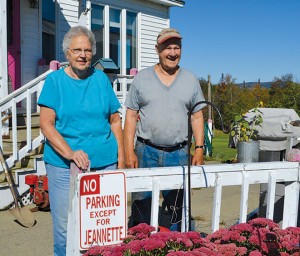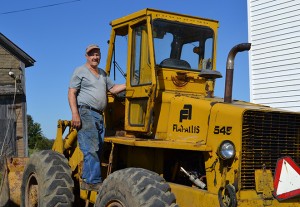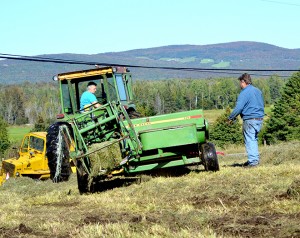

Editor’s note: Henry Labrecque died on December 7, 2012. In his memory, we republish here an interview Chris Braithwaite did with Mr. Labreque that was first published in the Chronicle in the fall of 2011.
by Chris Braithwaite
copyright the Chronicle, September 28, 2011.
BARTON — Nothing could seem more normal on a sunny afternoon in late September than to see Henry and Jeannette Labrecque harvesting a hay crop from a field beside the Cook Road.
The couple might have been seen in such a field more than half a century ago, working with equipment that was a little smaller, a little slower. But then, as now, you would expect to see Mrs. Labrecque behind the wheel of the tractor.
“One thing I always liked was driving tractor,” she said in a recent interview.
Henry Labrecque might have been seen there 70 years ago, a strapping young teenager, perhaps driving the team of horses, perhaps building the load of loose hay on a wagon.
He has lived on the farm for all but the first four of his 83 years, and worked on it almost that long.
He has a crystal clear memory of his eighth birthday present, a privilege bestowed by his father:
“I could start milking cows by hand. I’ll never forget that. I thought I was a man.”
One of his earliest memories of life on the farm, which sits on a deceptively sharp curve on the road to Willoughby Lake, is less positive.
The farmhouse had a bad foundation, he recalls, and its movement had opened cracks in the roof. A few months after the family moved there in October 1932, young Henry woke in his upstairs bedroom to find “a couple of inches of snow on the sheets.”
That morning, he recalled with a smile, “it didn’t take too long to get dressed.”
Mr. Labrecque’s French-Canadian family had arrived at their ramshackle farmhouse in northern Vermont by an indirect route, one that reflected the times they coped with.

His mother, Marie Anne, had moved from Montreal to Lawrence, Massachusetts, to join hundreds of young women in the textile mills. His father, Jeremie, had moved nearby from his family’s Quebec farm to work at Fafnir Bearing. They met at the wedding of his neighbor and one of her friends, and married in 1927.
Then the Depression hit.
“In 1931 he got laid off and moved up here, to the Kittridge farm,” Mr. Labrecque said.
That place, now fallen into a ruin, had just been remodeled by the father of Tony Pomerleau, the Burlington developer who is playing a key role in Newport’s redevelopment.
“But he lost it,” Mr. Labrecque said of his father and the Kittridge farm. “Then he moved here, to the old Pete Damon place.”
Of Mr. Damon’s reason for leaving, Mr. Labrecque said, “Things went wrong with him, too.”
Things were going wrong for a lot of farmers in the early ’30s. Mrs. Labrecque recalls the bankers of the day with no hint of affection in her voice.
“If they missed a payment by one day, they were evicted,” she said of farmers like Pete Damon.
Yet the bankers gave Jeremie Labrecque a bit of a break.
“The deal was he could stay here, and if he could make a go of it, they’d sell it to him,” Mr. Labrecque said. “In 1934 they did.”
The farm, then 120 acres, sold for “right around $3,500.”
His father started out with about a dozen cows, milking them by hand.
There was no electricity, Mr. Labrecque recalls. “We got it the day before Christmas, 1942, which was a Saturday.”
He has sharp memories of the electricians who busied themselves in the house that day, particularly of one universally known as Old Tink Prescott. “He’d stick his finger in his mouth, then stick it in the socket and say ‘Yep, there’s electricity there.’”
The herd grew steadily over the next decade, as Henry Labrecque grew up. “When we were married in 1954 there were 25, maybe nearer 30,” Mr. Labrecque said.
“I grew up in Newport Center, a whole 23 miles from here,” Mrs. Labrecque said.
“I knew the road to Newport Center,” her husband said.
He said that with a smile that seemed to recall a farmer in his mid-twenties wooing the girl who would be his wife for (so far) 57 years and with whom he would raise seven children.
It was important to both parents, as their family grew, that they retain the French language.
All seven of their children can speak French, and at least one grown son, Richard, still slips into that language when he talks to his parents.

Mrs. Labrecque is a plain-spoken woman, and her voice still conveys some of the fury she felt when a teacher sent a daughter home with the advice that she should be speaking English in their home.
“There was no English spoken in this house,” she said. “How else would they keep their French?”
“When I started school I knew one word in English,” Henry Labrecque said. “That was ‘No.’”
At his first day of school he couldn’t so much as ask to go to the bathroom. Finally recognizing his discomfort, the teacher found a bilingual classmate, a girl who figured out the problem and led young Henry to the outhouse.
Then she translated the teacher’s instructions on the universal code, using his fingers to indicate number one and number two.
But he can still hear the laugher that filled the one-room Devereaux schoolhouse when he raised his middle finger to his teacher, and she calmly bent it down and raised his index finger in its place.
“My mother never could talk English,” Mr. Labrecque said. “Dad could, after a while. I picked up the English language, but I kept the French.”
Speaking the French language in northern Vermont had its price, Mr. Labrecque said.
“French-speaking people were looked down on. If there was a good job, the English speaker got it. French people, they were farmers. They worked the land.”
On her drive to school, he recalled, “the teacher would pick up some of the Fisk kids that were neighbors, but I had to walk.”
Yet his bilingual ability proved to be critical to the work he did to support the farm. He’d drive north into Quebec to buy hay, Christmas trees, and brush for his wreath-making business.
Son Richard has taken that business over, and finds his French essential to negotiations with farmers on the other side of the border.
His business, and his ability to chat with his sources, has made Richard an expert on the state of the Quebec dairy industry. His key finding: Quebec’s supply management system, based on quotas, supports a thriving business while Vermont dairying continues to decline.
“When I got out of high school there were 17 farms between Barton and Willoughby Lake,” Henry Labrecque said. “Now there aren’t any.” He and Jeannette sold their cows in 1994.
Mr. Labrecque didn’t want to sell them, his wife recalled. “I said, ‘If you don’t want to sell the cows, you can do the work yourself.’ That changed his mind.”
While he has passed the hay and wreath business on to Richard, Henry continues to haul loads of gravel out of a pit on the farm, even as he recovers from major heart surgery in June.
Talk of the gravel pit brought back other memories of the Depression and the WPA, the Works Progress Administration created by President Franklin Roosevelt to put unemployed men back to work.
“In the winter of 1934-’35 they graveled the road to the Barton Village line — in the winter — with horses. The WPA had men in the pit shoveling gravel all winter.”
His father worked too, hauling gravel. “I think that first year it was $2.25 a day, the next year $2.50. That was for Dad, the horses and the wagon. That’s what kept the place from going under.”
He remembers touching hands with Roosevelt in 1934, when the President was campaigning in Newport for another term.
Another childhood memory involves the skin of a calf and a cattle dealer who, to this day, Mr. Labrecque is reluctant to name.
“It was during haying in July. I was seven. It would have been 1935. Dad told me, ‘If you skin that calf you can have the money.’”
He remembers running out to meet the cattle dealer as his rounds took him past the farm; remembers the dealer standing on the running board of his truck, his gold teeth, and his ability to speak French.
“All I could talk was French.”
Young Henry offered up the hide, and the dealer agreed to buy it.
“He picked through the change in his hand and gave me a Canadian dime.”
What Henry didn’t know was that the dime was worthless in Vermont.
“I went down to Medie Massey’s store for a nickel ice cream.” The store was at the corner of Main Street and Duck Pond Road in Barton.
“He asked me if I had any money. Boy, did I! I had a dime! Well, he didn’t give me no ice cream.”
Henry got the same reception at Ralph Moore’s store downtown, and from Mr. Boisvert on Upper Main Street.
“I went into Wallace Foss’ store. He asked if I had any money. I showed him my dime. He said ‘I’ll give you an ice cream and you keep your dime.’ I ended up giving it to the church.”
That dealer “was a tight-fisted son of a gun,” Mr. Labrecque said. Years later, at a dance in Glover, the dealer had a chance to ask the farmer why he never sold him any cattle.
“So I told him,” Mr. Labrecque said. “He denied it, but it was the truth.”
Asked which era of farming he most enjoyed, Mr. Labrecque was quick to respond.
“When the whole family was here. All the kids were here. We had problems, but they were enjoyable years.”
“It was a good life, but it was seven days a week,” he said.
“Sometimes,” Mrs. Labrecque added, “it felt like eight.”
To read an obituary of Henry Labrecque, please see the obituary pages for December 12, 2012.
For more free articles from the Chronicle like this one, see our Featuring pages. For all the Chronicle’s stories, pick up a print copy or subscribe, either for print or digital editions.







